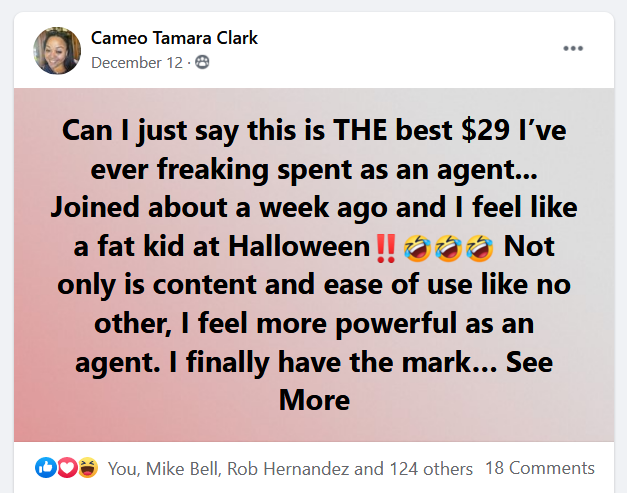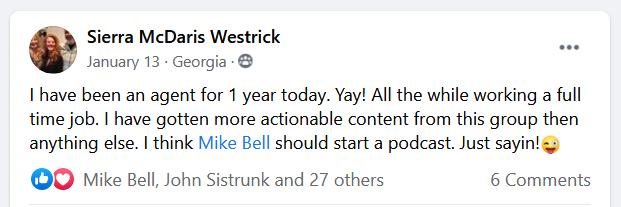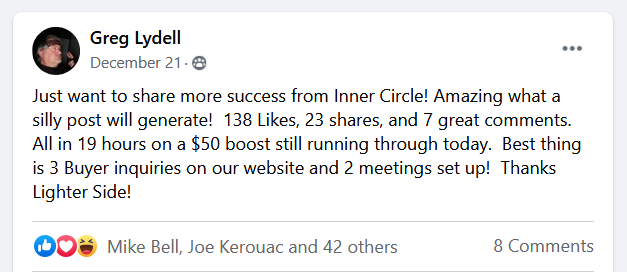
Are You An Agent Whose Entire Brand Feels… Bleh?
Hello dearest real estate friend. Glad you could make it today. What I want to do here is simple – convince you to be yourself.


You fell in love with a house.
You made an offer.
It was accepted!
Your mortgage process is going smoothly.
The appraisal justified the price you paid.
Everything is going perfect…
…and then you had the home inspected, and the report made it sound like the place is falling apart, and it’s a house only a bulldozer would love.
Hold up, before you end your love affair with the home of your dreams due to home inspection concerns, you should know that home inspection reports aren’t meant to be seen as a “pass” or “fail” assessment. There’s nuance to a home inspectors report. Inspectors will often make note of Every. Little. Thing. They. Find.
There are certainly some things an inspector might find that could be deal breakers — or at least warrant asking for them to be repaired or replaced — like a leaking roof, a broken furnace, or major structural issues. But there are also a lot of things inspectors include in their report that are pretty easy and inexpensive to fix, and aren’t worth losing a house you love over.
So let’s take a look at 7 things in a home inspection report that often get blown out of proportion, even though they’re probably not that big of a deal, so you know what to let slide:
A leaky faucet is annoying and something you’ll probably want to fix, but it doesn’t really impact the value of a house, or your ability to live in it safely. While you can certainly ask a seller to fix it, there’s a good chance they’ll get annoyed and might dig in on other issues they should fix or might have been willing to repair. Fortunately, a leaky faucet is typically a fairly easy and inexpensive thing to fix.
You should certainly feel free to ask the owner to replace a window that’s entirely broken because a baseball (or bat) went through it. But sometimes a window will have the tiniest little crack at the edge that isn’t letting any air in or out of the house, but it’s just unsightly. The chances are you won’t even notice it on a daily basis once you’re living in the house, so pick your battles and ask for something more important on the report instead.
Inspectors love using the term “at the end of its useful life” for many components of a house. However, whether it’s referring to the roof, the furnace, the AC unit, or any other part of the home, it doesn’t necessarily mean it isn’t working, or that it needs to be replaced. The inspector is often just noting that it’s something you’ll want to keep an eye on, and plan to replace in the future.
While home inspectors know a lot about houses overall, they’re not experts on every single thing in a house. One of those things is often the chimney.
For starters, it’s difficult for them to get as good of a look at the chimney as someone who specializes in inspecting and repairing them. If there are defects or it needs a good cleaning, it could start a fire, which is why inspectors often suggest getting a closer look at it out of an abundance of caution. So don’t get too worried; just schedule a separate inspection to be done by a chimney professional and see what their opinion is. There’s a good chance it’s fine and may just need a regular cleaning.
This is more common in older homes where the electrical work was installed prior to codes requiring ground fault interrupter outlets (GFI) in certain locations. If an inspector notes that you should have them in certain areas, it’s not a bad idea to have them installed once you own the house, but it’s not such a big issue that you should kill the deal over it.
Some cracks are certainly a big deal, but a lot of times there are minor cracks due to the house settling over time. If your inspector is truly concerned about a crack, they’ll make it abundantly clear that it might be dangerous or a structural issue. But if it’s not, they may just note it in the report because they don’t want to be accused of ignoring anything they see. If it’s just a minor cosmetic issue, don’t sweat it — it can usually be fixed with just a little spackle and paint.
If the inspector finds an area that’s outright wet, or even slightly damp, they’ll make sure you’re aware that there is a leak going on somewhere.
However, it’s not uncommon for an inspector to find water stains that are completely dry, but are obvious evidence that there was a leak at some point. As long as there’s no mold growing due to the homeowner ignoring it for too long, it’s often just some water staining due to a leak that was quickly repaired, but the owner didn’t do a great job repairing the cosmetics afterward. Again, this is another thing that a little paint can take care of once you own the home.

(Shh, our secret)
Show your sphere your an expert. We have over 2100 articles covering every real estate topic your audience will love.
Position yourself as a real estate authority!
Real estate + topical events — the perfect match!
Become the bearer of good vibes!
Because hey, everyone loves to laugh!



Get our weekly email that makes communicating with your sphere on social actually enjoyable. Stay informed and entertained, for free.

Hello dearest real estate friend. Glad you could make it today. What I want to do here is simple – convince you to be yourself.

As a real estate professional, you’ve got to be like Mary Poppins — prepared for anything and everything. Of course you need pens and your

Photograph by Nicolás García Photography is one of the most important aspects of a real estate listing. A property with stunning photos will generate more

Social media made marketing yourself as an agent about as cheap and easy as it comes. Years ago, you had to have a good chunk

Customer Relationship Management (CRM) systems are a necessary evil for real estate agents. Ideally they’ll make your life easier, keep you organized, and help you
Depending on your situation, it may not take the full 30 minutes.

This reset password link has expired. Check the latest email sent to you.















